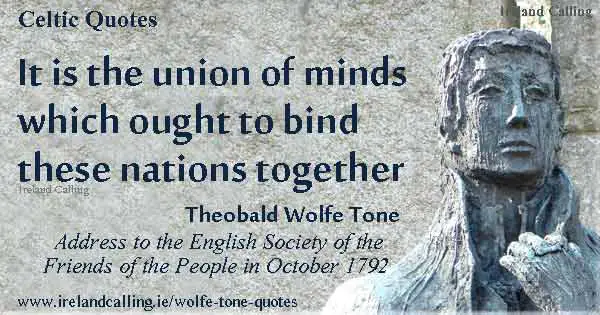Theobald Wolfe Tone was an Irish nationalist and one of the most influential figures in Ireland’s history. He was one of the founding members of the United Irishmen, a nationalist organisation that led the 1798 Rebellion against British rule. He is widely regarded as the father of Irish nationalism.
Ireland in the 18th and 19th centuries was subject to the Penal Laws, which meant Catholics, Presbyterians and Methodists were treated less favourably than Church of Ireland Protestants. There were limitations on their right to vote, own property and on their access to education.
Tone was a Protestant but supported the right of other religions to be treated equally. He helped set up the United Irishmen, which crossed all religions, to establish equal rights and eventually, self-rule for Ireland. He tried desperately to raise French support for rebellion and was later sentenced to death.
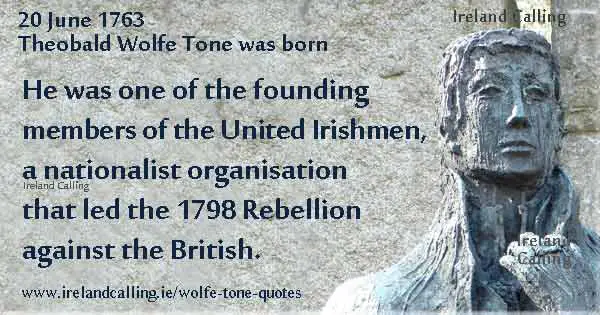
Wolfe Tone was was born in Dublin on 20 June in 1763 and was named after his godfather Theobald Wolfe of Blackhall, who was rumoured to be his actual father as well. He studied law at Trinity College Dublin and qualified as a barrister in London before becoming involved in politics. While still a student, he eloped with a young Dublin woman called Martha Witherington, who later changed her name to Matilda.
Tone soon became actively involved in politics. In September 1791, he wrote a pamphlet called, An Argument on Behalf of the Catholics of Ireland, which called for Catholic emancipation.
The pamphlet marked a difference in approach to that taken by leading Irish Protestants like Henry Grattan, whose work had helped create an Irish parliament but only on the basis that it excluded Catholics and other non-Conformist religions like Presbyterianism. While Grattan continued to campaign for Catholic rights, he was also committed to maintaining Ireland’s ties with England. Tone on the other hand, was moving towards a position of total independence. He believed the best way to achieve this was to unite people of all religions in Ireland.
In October 1791, Tone and other leading nationalists like Napper Tandy and Thomas Russell co-founded the Society of United Irishmen, with the principle of Catholics and Protestants uniting to become a stronger force to influence British policy. They initially intended to improve the lives of the Irish through political reform. They had some success. In 1793, King George and the British government agreed to allow Catholics to vote if they owned property worth an annual rent of 40 shillings. These became known as the ‘forty shilling freeholders’.
However, Catholics still couldn’t hold senior positions in the state or become Members of Parliament. This lack of progress turned the United Irishmen towards a more radical approach and they came to see rebellion as the only way to enable Ireland to manage its own affairs.
By 1794, the United Irishmen had become a more militant organisation with members taking oaths aimed at overthrowing British rule. From the outset, however, it was beset by traditional rivalries between Catholics and Protestants, and even by divisions within each group.
Fighting between Catholics and Protestants wasn’t uncommon, although the conflict was generally a result of disputes over land as opposed to religion. The British tried to fuel this unrest to prevent the organisation growing stronger.
In 1994, the United Irishmen began an exercise to gauge how much support there was in Ireland for a rebellion. The task was led by Irish clergyman William Jackson, who had spent many years in France and was heavily influenced by the freedoms won in the French Revolution. Tone drew up papers to help Jackson, outlining the current state of affairs in Ireland at the time and suggesting that it was ready for rebellion. However, the papers were betrayed to the British and Jackson was charged with treason.
Many United Irishmen leaders were forced to flee the country or face a death sentence. Tone was spared execution because of his links to some members of the government. He was instead exiled to America, but before leaving, he made a speech to his fellow United Irishmen like Thomas Russell and Henry Joy McCracken that included the words: “Never desist in our efforts until we subvert the authority of England over our country and assert our independence.”
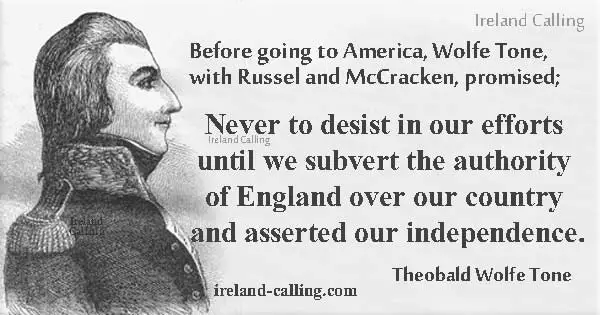
By 1796, the United Irishman had reformed and were now determined on rebellion. Tone felt frustrated in America because he was too far away to influence the planning. France was involved in conflict with Britain at the time so he travelled to Paris and tried to gain support for an uprising in Ireland. He served in the French army under Lazare Hoche, who agreed to send soldiers and supplies. On two separate occasions, ships loaded with arms and men were sent to Ireland by Hoche, but were unable to complete their journey due to bad weather or British interference.
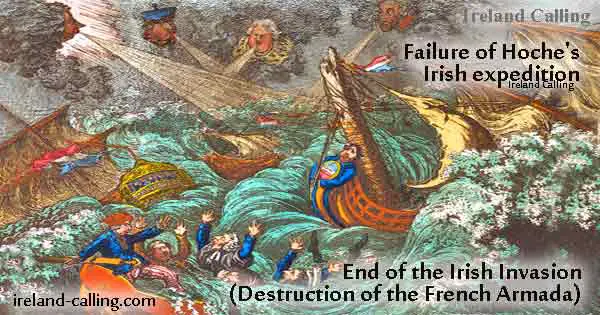
When Hoche died, Tone had to request support from Napoleon, who was less inclined to involve the French in Ireland’s cause, although he agreed to send three ships with Tone travelling with them. The ships were intercepted by The British as the 1798 Rebellion began, and Tone was captured and imprisoned.
The people of Bantry erected the statue looking out to sea… it’s to be taken as symbolic of the hope for French help, rather than a literal portrayal of Tone’s location. He was actually on a French ship when the 1798 rebellion broke out.
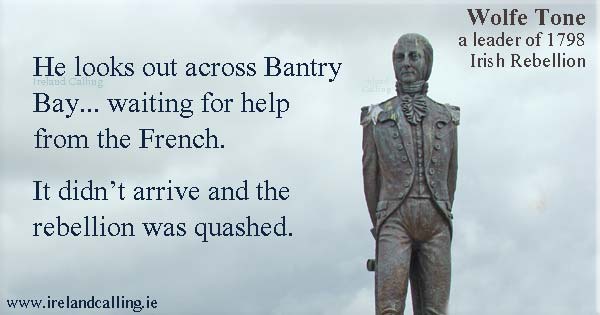
In court, Tone knew he would be sentenced to death so he requested that he be shot so he could die like a soldier, rather than be hanged. This request was denied so while awaiting execution, he tried to kill himself by slitting his throat. He was saved and his neck was bandaged, with the doctor telling him that if he spoke then the bandage would be disturbed and he would bleed to death. Wolfe Tone responded with: “So be it” which led to his death.
Here are two extracts from the speech Wolfe Tone made before he was told his sentence in court. The first is an explanation of why he joined the French military:
“I entered into the service of the French republic with the sole view of being useful to my country. To contend against British Tyranny, I have braved the fatigues and terrors of the field of battle; I have sacrificed my comfort, have courted poverty, have left my wife unprotected, and my children without a father. After all I have done for a sacred cause, death is no sacrifice. In such enterprises, everything depends on success: Washington succeeded – Kosciusko failed. I know my fate, but I neither ask for pardon nor do I complain. I admit openly all I have said, written, and done, and am prepared to meet the consequences. As, however, I occupy a high grade in the French army, I would request that the court, if they can, grant me the favour that I may die the death of a soldier.”
This is an extract of Wolfe Tone’s speech about his feelings regarding the violent rebellion which was occurring in Ireland, with several battles being fought between the United Irishmen and the British army:
“Such are my principles such has been my conduct; if in consequence of the measures in which I have been engaged misfortunes have been brought upon this country, I heartily lament it, but let it be remembered that it is now nearly four years since I have quit Ireland and consequently I have been personally concerned in none of them; if I am rightly informed very great atrocities have been committed on both sides, but that does not at all diminish my regret; for a fair and open war I was prepared; if that has degenerated into a system of assassination, massacre, and plunder I do again most sincerely lament it, and those few who know me personally will give me I am sure credit for the assertion.”
Tone died aged 35 on 19 November, 1798 in Provost’s Prison in Dublin. He is buried in Bodenstown in Co Kildare near his birthplace at Sallins. His only surviving child, William, was brought up by his mother in France and was later granted French citizenship. He fought in the French army before emigrating to America.
Wolfe Tone and the 1798 Rebellion failed but he remained an iconic figure in Irish nationalist circles and was often quoted by the leaders of the 1916 Easter Rebellion more than a hundred years later. There are statues in his honour across Ireland, most notably in Bantry and in St Stephen’s Green in Dublin.
Click for more memorable quotes from Wolfe Tone
See our BITESIZE articles on the history of the 1798 Rebellion
Wolfe Tone – leader of 1798 United Irishmen Rebellion
